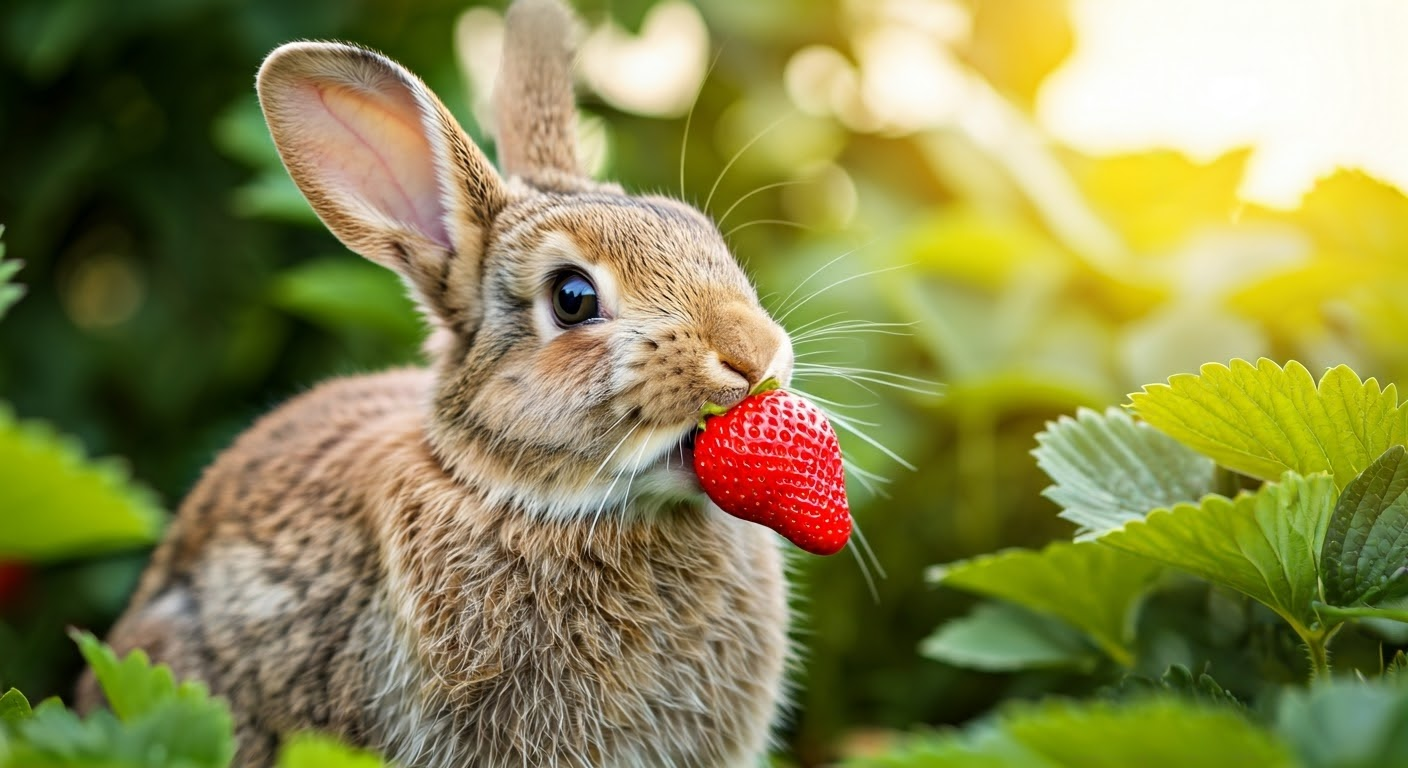Key Highlights
- Rabbits can have strawberries as an occasional treat, but only in moderation.
- Strawberries have vitamins, antioxidants, and help keep them hydrated because they contain a lot of water.
- Limit feeding strawberries to 1-2 times a week. The portion size should depend on your rabbit’s weight.
- Always wash strawberries well to get rid of any pesticides.
- Watch your rabbit for any digestive issues after you start giving them strawberries.
- Focus on hay, leafy greens, and rabbit pellets as the main parts of your rabbit’s diet.
Curious if your pet rabbit can eat a juicy strawberry? Yes, rabbits can enjoy strawberries as a tasty treat. These bright fruits offer some nutrition, but they have high sugar content. Because of this, strawberries should not be a regular part of your rabbit’s diet. It is important for rabbits to have a balanced diet. This diet mainly includes hay, fresh vegetables, and a small amount of fresh veg pellets. A balanced diet is key for good health.
Understanding Strawberries’ Health Benefits for Rabbits

Strawberries are a good source of vitamin C for rabbits. You can add them to their meals in small quantities to make them tasty. But, because strawberries have high sugar content, it’s smart to give them in moderation. This way, your pets stay healthy. You can treat them to strawberries now and then. Pair them with fresh vegetables and leafy greens for a balanced diet. It is also important to watch the portion size. This helps prevent weight gain and keeps your rabbit’s digestion good.
Essential Vitamins and Minerals Found in Strawberries
Strawberries are good for rabbits if they are eaten in moderation. They contain important vitamins and minerals that support your rabbit’s health. Here’s the benefit of strawberries for them:
- Vitamin C: Rabbits produce their own vitamin C. However, strawberries can offer a bit more to help their immune system stay strong.
- Antioxidants: Strawberries contain antioxidants. They help protect your rabbit’s cells from damage by free radicals. This support can keep them healthy and help them live longer.
- Water Content: Strawberries consist of around 91% water. This high level of water keeps rabbits hydrated, which is important, especially in hot weather.
The Role of Strawberries in a Rabbit’s Diet
Strawberries can be a tasty treat for rabbits, but you should give them in small amounts. They have a high sugar content. If you give too many, it can cause health problems like weight gain or an upset stomach. Strawberries have some health benefits, such as vitamin C and antioxidants, but they shouldn’t be a big part of a rabbit’s diet. Always check with a veterinarian before giving new foods like strawberries. They can guide you on what is best for your rabbit’s needs. Remember to keep strawberries in moderation. Watch how many strawberries you give to avoid digestive issues.
Potential Risks When Feeding Strawberries to Rabbits

Feeding strawberries to rabbits is mostly safe. However, there are some risks because of the sugar content. It is important to limit how many strawberries they eat. This helps avoid health problems in the long run. Always keep your rabbit’s health in mind. If you have any concerns, talk to your vet.
The Concern with Sugar and Acid Content
Strawberries and other berries contain a lot of sugar. This can be bad for rabbits. Rabbits need high-fiber and low-sugar food. Good options are hay and leafy greens. They can also have blueberries and raspberries. Eating too much sugar can lead to health problems, such as:
- Diarrhea: Giving your rabbit too many strawberries can upset their stomach and cause diarrhea.
- Weight Gain: Sugary treats, such as strawberries, can lead to weight gain and may cause obesity in rabbits.
- Tooth Decay: A lot of sugar can damage rabbits’ teeth, just like it does to people.
How to Mitigate the Risks of Pesticides
Like several fruits and vegetables, strawberries can have pesticides, just like kale. These chemicals can be harmful to your rabbit if they consume them. To reduce this risk, follow these steps:
- Wash Thoroughly: Always rinse strawberries with running water before giving them to your rabbit. This helps remove any dirt and pesticides.
- Choose Organic (When Possible): Whenever you can, select organic strawberries. They do not have synthetic pesticides, making them safer for your rabbit.
- Consult Your Veterinarian: If you are unsure about where your strawberries are from or have concerns about pesticides, consult your veterinarian for guidance.
Conclusion
In conclusion, it’s important to know how feeding strawberries to rabbits can affect their health. Strawberries can have health benefits, like vitamins and minerals. But, you should also consider the sugar content and pesticides. Feeding them in moderation and preparing them correctly can reduce these risks. You should learn how often to give strawberries to your rabbits and which parts are safe to eat. If you have questions, it’s best to ask a vet for help on adding strawberries to your rabbit’s diet safely. Take care of your furry friend by making smart choices about their food.
Frequently Asked Questions
How often can rabbits eat strawberries?
Strawberries can be a good occasional treat for rabbits. You should give them in small amounts and do this about 1 to 2 times a week. Rabbits make their own vitamin C, so they don’t need many strawberries for their diet.
What part of the strawberry is safe for rabbits?
Rabbits can eat several parts of the strawberry. This includes the leaves, tops, and fruit. The green parts have less sugar and provide good fiber. Be sure to wash all parts before you feed them.
Can baby rabbits have strawberries?
Giving any fruit, including strawberries, to a baby rabbit can upset its stomach. This can cause serious issues like gut stasis. It is best to wait and avoid feeding them fruits until they are older.
Are there any fruits rabbits should avoid?
Rabbits need to avoid fruits that are high in sugar. This sugar can harm their digestive system and make them gain weight. Some fruits to steer clear of include grapes, bananas, and cherries. Even having a small amount of fruit can cause weight gain and tooth decay. These fruits can also lead to health problems, like an upset stomach and obesity.

Hi, I’m Sondip,
I’m a writer who loves to help people solve their problems. I write about small animals like mice and other small animals and even pests.

